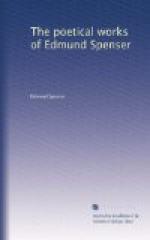One day, whiles that my daylie cares did sleepe,
My spirit, shaking off her earthly prison,
Began to enter into meditation deepe
Of things exceeding reach of common reason;
Such as this age, in which all good is geason*,
And all that humble is and meane** debaced,
Hath brought forth in her last declining season,
Griefe of good mindes, to see goodnesse disgraced!
On which when as my thought was throghly@ placed,
Unto my eyes strange showes presented were,
Picturing that which I in minde embraced,
That yet those sights empassion$ me full nere.
Such as they were, faire Ladie%, take
in worth,
That when time serves may bring things
better forth.
[* Geason, rare.] [** Meane, lowly.] [@ Throghly, thoroughly.] [$ Empassion, move.] [% Faire Ladie. The names of the ladies to whom these Visions and those of Petrarch (see p. 210, VII. 9) were inscribed have not been preserved. C.]
II.
In summers day, when Phoebus fairly shone,
I saw a Bull as white as driven snowe,
With gilden homes embowed like the moone,
In a fresh flowring meadow lying lowe:
Up to his eares the verdant grasse did growe,
And the gay floures did offer to be eaten;
But he with fatnes so did overflows,
That he all wallowed in the weedes downe beaten,
Ne car’d with them his daintie lips to sweeten:
Till that a Brize*, a scorned little creature,
Through his faire hide his angrie sting did threaten,
And vext so sore, that all his goodly feature
And all his plenteous pasture nought him
pleased:
So by the small the great is oft diseased**.
III.
Beside the fruitfull shore of muddie Nile,
Upon a sunnie banke outstretched lay,
In monstrous length, a mightie Crocodile,
That, cram’d with guiltles blood and greedie
pray
Of wretched people travailing that way,
Thought all things lesse than his disdainfull pride.
I saw a little Bird, cal’d Tedula,
The least of thousands which on earth abide,
That forst this hideous beast to open wide
The greisly gates of his devouring hell,
And let him feede, as Nature doth provide,
Upon his iawes, that with blacke venime swell.
Why then should greatest things the least
disdaine,
Sith that so small so mightie can constraine?
[* Brize, a gadfly.] [** Diseased, deprived of ease.]
III. 7.—Tedula. Spenser appears to mean the bird Trochilos, which, according to Aristotle, enters the mouth of the crocodile, and picks her meat out of the monster’s teeth. C.




